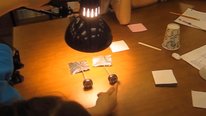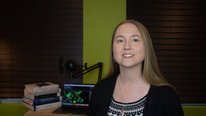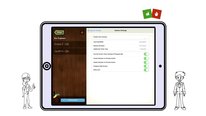- Jianlan Wang
- Assistant professor
- Measuring and improving Pedagogical Content Knowledge of student assistants in introductory physics classes
- https://www.pck-q-ttu.com/
- Texas Tech University
- Stephanie Hart
- Director of OnRamps program
- Measuring and improving Pedagogical Content Knowledge of student assistants in introductory physics classes
- https://www.pck-q-ttu.com/
- Texas Tech University
- Beth Thacker
- Associate professor
- Measuring and improving Pedagogical Content Knowledge of student assistants in introductory physics classes
- https://www.pck-q-ttu.com/
- Texas Tech University
- Kyle Wipfli
- Research Assistant
- Measuring and improving Pedagogical Content Knowledge of student assistants in introductory physics classes
- https://www.pck-q-ttu.com/
- Texas Tech University
Public Discussion
Continue the discussion of this presentation on the Multiplex. Go to Multiplex










Karl Kosko
Very interesting project!
In studying PCK of Questioning, are you looking at any sub-constructs (such as Ball et al.'s Knowledge of Content & Teaching / Knowledge of Content & Students)?
Jianlan Wang
Assistant professor
Thanks. Yes, we are looking at sub-constructs of PCK by synthesizing two models: Magnusson et al.'s model for science education (Orientation, knowledge of curriculum, knowledge of students, knowledge of assessment, and knowledge of instructional strategy) and Ball et al.' model for math education (knowledge of curriculum, KCS, and KCT). So far, we have four sub-constructs: 1) awareness/preference of using questions to respond to students; 2) knowledge of the curriculum used by students; 3) knowledge of students' understanding/struggles/difficulties about a specific concept; 4) knowledge of appropriate questions that could potentially be effective in guiding students.
Stephen Alkins Ph.D.
Jianlan Wang
Assistant professor
Student assistants (SA), including graduate and undergraduate teaching/learning assistants, are pivotal to non-traditional physics instruction in large classrooms. Despite its effectiveness, little is known about how SAs’ Pedagogical Content Knowledge (PCK) affects SA-student interactions and how those interactions promote students’ learning. We are particularly interested in SA’s PCK of questioning (PCK-Q) skills. In this workshop, we will present a multi-level coding scheme to analyze SA support in different vignettes of SA-student interactions in class videos. The frequency of certain levels in multiple vignettes could suggest a measure of SA’s performed PCK-Q. We will also present a written instrument with open-ended questions assessing SAs’ narrated PCK-Q in given situations which are drawn from vignettes of authentic SA-student interactions. We will demonstrate the process of developing and validating the coding scheme and written instrument and their use in studying SAs’ impact on students’ conceptual understanding of physics and critical thinking skills. More information can be found on our webpage, www.pck-q-ttu.com.
Stephen Alkins Ph.D.
Stephen Alkins
Diversity, Equity, and Inclusion Officer
Just as a note, the link you provided seems to be broken or does not lead to a functional website.
Jianlan Wang
Assistant professor
Thanks for the note. I will fix it soon.
Stephen Alkins
Diversity, Equity, and Inclusion Officer
This is a great framework that could be used as professional development for SAs to know how they should approach students! One aspect that I would add to the criteria for assessing SA efficacy would be an empathy/emotional intelligence. Being able to gauge the emotional state of the student helps inform the proper approaches to use. Additionally, flexibility of knowledge in the content area may be another criterion. The ability for an SA to perceive and explain multiple applicable contexts a physics concept demonstrates flexibility with the material and a greater ability to support a range of students (i.e. meeting the students where they are in their understanding). Perhaps this is covered in your fourth sub-construct, however.
Thank you for the great work!
Jianlan Wang
Assistant professor
Those are GREAT suggestions. Thanks a lot. I totally agree that emotional scaffolding is critical for students in a self-paced lab-oriented learning environment. This is the advantage of SAs because they are more knowledgeable peers who have experienced the same process of physics learning and are more likely to reach "resonance" with students. On the other hand, SAs are less prepared or skilled in dealing with emotionally hard time from students, so they are more likely to be an answer fairy. It's challenging for SAs to find a balanced point between shielding students from overwhelmingly negative feelings and encouraging them to struggle through difficulties prior to the uh-huh moment. I think this is also related to the "flexibility of knowledge" that you mentioned. It's definitely worth of attention, but sometimes it's hard to capture students' or SAs' emotions. More accurately speaking, it's hard to infer their emotions from video cues like their actions or facial expressions, and transfer that information into quantitative data. Any further suggestions would be appreciated.
Stephen Alkins Ph.D.
Wendy Smith
Research Professor
This is a very interesting project. I work on a research project that includes student assistants in mathematics, so have two questions for you:
--what training do the student assistants get? (in your case, presumably in questioning strategies)
--How much is your PCK-Q going to be tied to physics content, or do you think the PCK-Q is somewhat content-independent, and similar questioning knowledge and skills would be applicable in other (STEM) disciplines?
Stephen Alkins Ph.D.
Jianlan Wang
Assistant professor
Thanks. To your first question, we have several candidate strategies suggested by research, such as instructor modeling appropriate questions, SAs role play, and SAs reflecting on their own videos. Actually, we have been trying some of them. The difficulties are: 1) The time of SA-training sessions is limited. SAs, especially undergraduate learning assistants (LA), may not have sophisticated content knowledge. Thus, the priority is to walk SAs through the curriculum, which leaves limited time for pedagogical training. 2) We are developing the instrument to measure SAs' PCK-Q, without which, it's hard to reflect on the efficacy of certain strategies. To your second question, we will develop two instruments to measure SAs' PCK-Q, i.e. coding schema to analyze SAs' performed knowledge of questioning and written tests to assess SAs' narrated knowledge of questioning, which will hopefully validate each other. Both are content-dependent because that is the nature of PCK, and both contain elements that are applicable in other STEM disciplines. For the former, it is the types of questions and patterns of SA-student interaction (e.g. students' lab result does not match a theory, what should a SA do?) that are transferable. For the latter, what transferable is the process of developing quizzes from authentic classroom scenarios and the context or background information provided in question stems.
Stephen Alkins Ph.D.
Feng Liu
Senior Researcher
Thanks for sharing this interesting project! It is important to have a reliable and valid instrument to measure student assistants (SAs) effectiveness in order to conduct a rigorous study on SAs’ impact on student outcomes. As you mentioned, the instrument is designed to measure four constructs in relation to SAs’ pedagogical content knowledge of questioning. I would like to know more about the validation process. What type of validity evidence are you going to collect? Internal structure, and construct validity, concurrent validity, or all of them? What approach are you going to use for the validity study, classical testing theory (e.g., factor analysis) or item response theory (e.g., 1PL IRT/Rasch modeling)?
Michael I. Swart
Stephen Alkins Ph.D.
Jianlan Wang
Assistant professor
This is a good question. Validity and reliability of instruments are our top concerns. We will have two instruments, coding schema for classroom video analysis and written tests. For coding schema, we will check theoretical validity (whether codes are supported by educational theories), predictive validity (practice coded at different time points are consistent with each other or match a reasonable pattern of practice development), convergent validity (refer to narrated knowledge measured by written tests, correlation and multi-linear regression will be used. Correlation is for the assumption that knowledge and practice are parallel to each other, and regression is for that knowledge determines practice.), inter-rater reliability (ICC probably will be used). For written tests, we will check face validity (feedback from the external reviewer and test respondents), construct validity (Rasch model for item difficulty and SA ability, and 2-parameter or 3-parameter IRT after we convert open-ended test questions to multiple-choice ones), theoretical validity, predictive validity, convergent validity (refer to coding schema), inter-rater reliability (ICC again for open-ended test questions), and test-retest reliability (the same SAs take tests several times? but we are not sure as tests may be edited). Concurrent validity will not be considered because to our knowledge, there has been no such a tool to quantitatively measure SAs' PCK-Q. Please correct us if we are wrong, and inform us of the existing tools.
Michael I. Swart
Stephen Alkins Ph.D.
Feng Liu
Senior Researcher
Thanks for sharing these details, Jianlan. I am impressed that you would collect such amount of evidence of reliability and validity. I think these will definitely help with the future adoption of the instruments by a broader audience!
Michael I. Swart
A cool project. Thank you for articulating a bit about the PCKQ framework. As Feng mentioned, am looking forward to hearing more about the validation and reliability metrics of this framework, as well as what research questions you are answering with the robots cameras documenting group collaboration and learning.
Jianlan Wang
Assistant professor
Thanks for the encouragement.